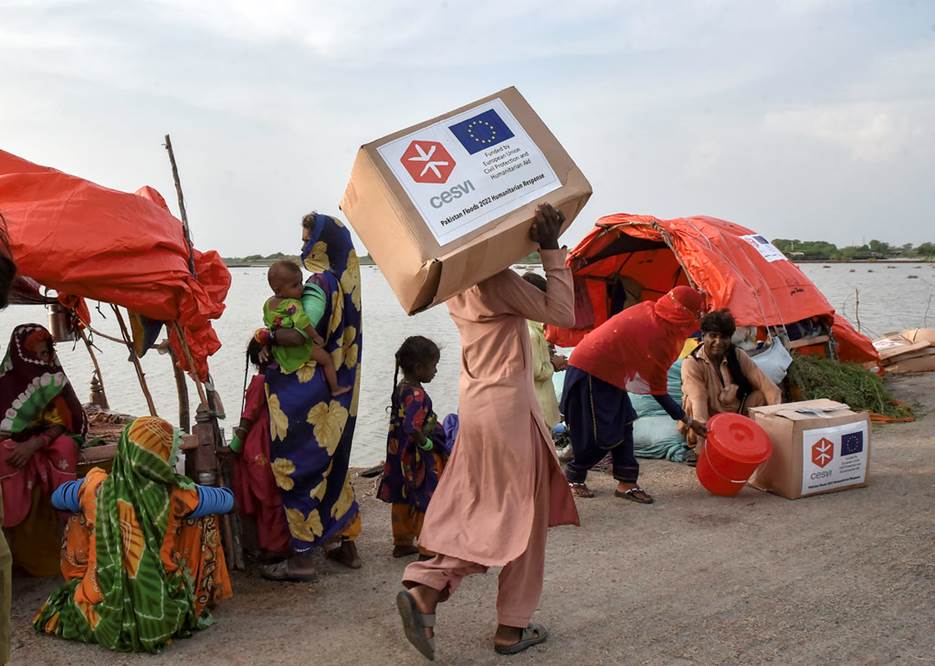
Aid worker provides support after intense flooding in Pakistan - Image courtesy of Flickr.
Climate Reparations for Pakistan Are Long Overdue
By Hira Khan
Wellesley College, Boston

“Every year the water comes, and every year we drown,” says Qurban Ali Lashari for the Financial Times.
Lashari is one of 33 million Pakistanis who have been affected by ravaging floods in the Pakistani provinces of Balochistan and Sindh. The effects of the flooding have been catastrophic ; since June 2022, over 1.2 million livestock have been killed, 7.9 million people have been displaced and severe food shortages are expected in the flood’s aftermath. Lashari and approximately 598,000 others are currently living in relief camps after their homes were swept away.
The flooding began during Pakistan’s monsoon season, which usually causes localized flooding in several regions of the country. This year, however, torrential rainfall brought record-breaking floods to Pakistan, causing a humanitarian crisis and damage that will take over $30 billion to repair.
Unsurprisingly, climate change is the reason for this escalation — a study by the World Weather Attribution group concluded that 50% of the rainfall that contributed to the devastating floods could be traced back to climate change. This is especially infuriating because out of all the world’s historic emissions that account for climate change, Pakistan is responsible for only 0.4%. Yet, it is bearing the brunt of the effects of climate change.
This situation is outrageously unfair. Developed countries like the United States are responsible for a majority of the world’s carbon emissions, and yet they are not as severely affected by climate change. The US has pledged $50 million in aid and “long-term support” to Pakistan, but that’s a pittance when we remember that Pakistan needs $30 billion to make a full recovery. The World Bank has pledged $2 billion, a couple steps up from other nations’ pitiful help, but at the end of the day, it’s not enough.
For years, we have droned on and on about the frightening impacts of global warming and how we need to enact change now if we want to save the Earth. But developed nations still continue in their gluttonous ways, burning fossil fuels like there’s no tomorrow (ironically, there won’t be at this rate of energy usage). Meanwhile, countries like Pakistan, which contribute almost nothing to global carbon emissions, suffer the consequences. What is needed are climate reparations. The world’s biggest carbon emitters, like the US, China, and the European Union, must donate enough to meet the $30 billion marker. In doing so, they will not only expedite Pakistan’s road to recovery, but they will also acknowledge the role they play in repairing the damage they have done. Furthermore, the Loss and Damage Fund that developing countries have demanded for years must be given; it is time developed countries took accountability for their heinous actions.
It is also imperative that support is given to smaller organizations seeking to raise money for humanitarian crises like the Pakistan floods. For example, the Wellesley Pakistani Students’ Association (PSA) has organized several henna and mango lassi fundraisers to aid flood relief efforts. It is incumbent on the Wellesley student body to support the PSA and ensure its voice leaves echoes across the campus and beyond. Uplifting such organizations is crucial to giving Pakistan the aid that First-World countries refuse to.
The abhorrent truth about rich nations is that they will not care about climate change until it begins to affect them. Until then, we will continue to be desensitized to the struggles of Black and Brown communities across the world. We will look online at images of drowned villages and shake our heads before going back to our comfortable, environmentally unsustainable lives. We will nod in agreement with Joe Biden when he vaguely says that Pakistan “needs help” at the UN General Assembly. But when none of it is enough for the people of Pakistan, we will conveniently forget their struggles and make no attempt to change our extravagant ways of living.
Rich countries must begin acknowledging the role they play in devastating humanitarian crises like the flooding of Pakistan. Their accountability is the first step in creating a global climate change solution, one that is desperately needed.

